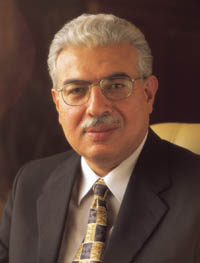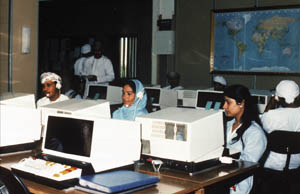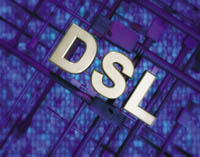Restructuring and reform of the
telecommunication sector: a top priority…
 Ahmed Nazif Ahmed Nazif
Minister of Communications and Information Technology
Arab Republic of Egypt
In most countries of the Arab region,
restructuring and reform of the telecommunication sector have become a
top priority issue enjoying full government support. This support is key in
facing the challenges encountered in the reform process and in building modern
telecommunication and information technology infrastructure. Contributing
strongly as it does to the development of other sectors, telecommunication has
become a substantial factor of economic growth, and is essentially vital to the
improvement of society in the areas of education, health, the environment and in
almost every aspect of daily life.
The evolving technical capabilities of digital technology
tend to change the operating procedures, the commercial character of
telecommunications and the international environment; hence the need for a
structure that is adapted to these situations and functions. The new network
concept introduced to allow the transmission of all voice, data and video
applications will, because of its adequate capacity and ability to convert
different systems and different telecommunication protocols, finally lead to the
convergence of information technology, telecommunications and broadcasting.
In order to assess the obstacles that prevent the development
of telecommunications and information technologies in the Arab region, and to
identify the means to address this hindrance within the framework of the
strategies and programmes to be tabled at the upcoming World Telecommunication
Development Conference (WTDC–02), the Regional Preparatory Meeting for the
Arab States was held in Alexandria in October 2000 at the invitation of the
government of Egypt. The meeting was organized by the ITU Telecommunication
Development Bureau (BDT) and brought together more than 200 participants from 23
countries. Participants discussed and identified priority areas of concern to
the countries of the region, and agreed on the strategies to be adopted and
pursued. Top priority issues are presented in this article.
Policy and regulatory issues
Regulators in the region are facing a
number of issues such as the process for the establishment of sound
regulatory bodies, and the different regulatory functions to be entrusted to
them. The regulation process is not a single event; nor can it be considered as
a single set of rules. Rather, it is an on-going process that changes as the
market develops and involves a series of difficult decisions, the nature of
which changes with time.
Given that the number of countries in the region planning to
establish a regulatory body is expected to rise by at least 13 in the coming few
years, the Alexandria meeting considered regulatory issues to be a high priority
for the Arab region and suggested having this item placed on the agenda of WTDC–02.
Furthermore, BDT was requested to provide advice and support to the countries of
the region based on the regulatory status of each country. BDT was also asked to
carry out studies on quality of service (QoS) and other issues of benefit to
end-users.
 A section of the international operator’s room in Muscat
A section of the international operator’s room in Muscat
Photo: Ministry
of PTT, Oman (ITU 900030)
|
Financing and investment strategies
Huge investments are needed for
the development of efficient telecommunications infrastructure in the Arab
region. However, the majority of Arab countries will no longer be able to fully
finance their requirements from traditional resources, namely internal cash
generation and government-backed funding, as most governments are facing
budgetary constraints. Alternative solutions have to be sought, and private
investment must be encouraged. A growing number of developing countries have
already involved the private sector through various methods, including resource
and risk sharing such as the build-operate-transfer (BOT) and other
revenue-sharing methods. There is need for:
-
Assistance to telecommunication network operators in
developing tools to determine costs, their calculation and their allocation
to services.
-
Advice on means of attracting investment.
-
Assistance in establishing a macroeconomic, legal and
regulatory framework conductive to investment.
-
Assistance to Member States engaged in planning
privatization of their telecommunication sector.
-
Studies to assess the impact of tariffs on usage.
-
Adoption of a coordinated policy in respect of
alternative traffic routing, and making the necessary efforts to adapt
international telephone services tariffs.
Network development
The telecommunication industry has
undergone enormous technological changes in the past decade. The convergence of
computers, telecommunications and information technologies is expected to
bring new telecommunication products and services progressively within reach of
the global population. In addition, with the integration of technologies,
telecommunication administrations are under growing pressure from large national
and international users requiring access to new services.
An overview of emerging technologies was considered in order
to evaluate cost-effective solutions for high-capacity networks, taking into
account the existing infrastructure in the various countries. There is need for:
-
Advice on broadband access solutions such as very
high-speed digital subscriber line (xDSL) systems and ATM-based passive
optical networks (A-PON).
-
Advice on data security and privacy solutions for new
networks.
-
Introduction of telecommunication management network
(TMN) to improve network monitoring, control and management. New
technologies should be taken into account to ensure interoperability and
interworking between existing and new networks.
 DSL standards make it possible to introduce systems that
provide affordable access to the Internet, teleworking, distance learning and
multimedia services
DSL standards make it possible to introduce systems that
provide affordable access to the Internet, teleworking, distance learning and
multimedia services
Photo: PhotoDisc (ITU 000039)
|
Internet and new services
During the past few years, Internet has
added an enormous potential for social, cultural and economic development.
Introduction of IP-based services covers various applications of great
social, cultural and economic interest such as telemedicine, tele-education,
e-commerce and telebanking.
The Alexandria meeting recognized this issue as one of the
priorities for countries in the region and identified the need for:
-
Organizing appropriate forums to facilitate information
sharing and produce comparative studies on Internet experience in the
region.
-
Advice on evolution from circuit switched to IP-based
networks.
-
Developing more Arab content/portals in collaboration
with governments, Internet companies and multilateral and bilateral
organizations.
-
Provision of training and education to develop skills to
use the Internet, and raising Internet awareness.
-
Advice on policy, technical and economic aspects of IP
telephony.
-
Advice on development of e-commerce toolkits for
policy-makers and businesses.
Wireless communications
The past decade has been marked by
considerable development of telecommunication infrastructure, in particular the
massive use of radiocommunication media. Today, wireless infrastructure
covers a large part of the radio-frequency spectrum, along with new technologies
in the field of terrestrial and space telecommunications, fixed and mobile
services and sound and television broadcasting. This trend will obviously
continue and accelerate. And so prompt creation of the most appropriate
conditions is needed to prepare countries in the region to take their place in
the global information society. In particular, the meeting underlined the need
for:
-
Preparation and dissemination of models that identify the
most appropriate radiocommunication solutions likely to meet present and
future needs.
-
Provision of training to specialists in engineering and
strategic planning, information networks and broadcasting systems.
-
Advice on the establishment of organs for planning and
monitoring the use of the radio-frequency spectrum.
-
Assisting countries in the migration process from second
generation mobile to IMT–2000.
-
Assessing the implications of WRC–2000 for radio and
television service via satellite in the KU/KA bands.
Enhancing capacity building
The meeting recognized the challenges
of training and human resources development for the Arab region in the near
future. It is well recognized that regardless of how perfect a new structure may
be, the desired goals will not be achieved unless the human resources
that will implement it and use it are well prepared for their task.
In this respect, the meeting highlighted the following
priorities:
-
Assistance to training centres in adapting their products
and services to the changing needs of the telecommunication organizations.
-
Assistance on the establishment of complementary training
programmes, human resources development and cultural change in
telecommunication organizations to better meet the challenges of
modernization.
-
Identification of the main needs in the region in order to
define the key programmes to be developed and delivered in a timely manner.
International and regional cooperation
The meeting identified the pressing
needs of the least developed countries (LDC) in the Arab region and
called for immediate action to:
-
Mobilize additional resources for LDCs (e.g. TELECOM
surplus, Sector Members in the region).
-
Focus special assistance on one or two LDCs at a time.
-
Strengthen relations with regional and international
organizations and financial institutions in order to further Arab region
development activities.
-
Create a database in cooperation with ITU and other
regional organizations concerned, such as the League of Arab States and
ESCWA.
|